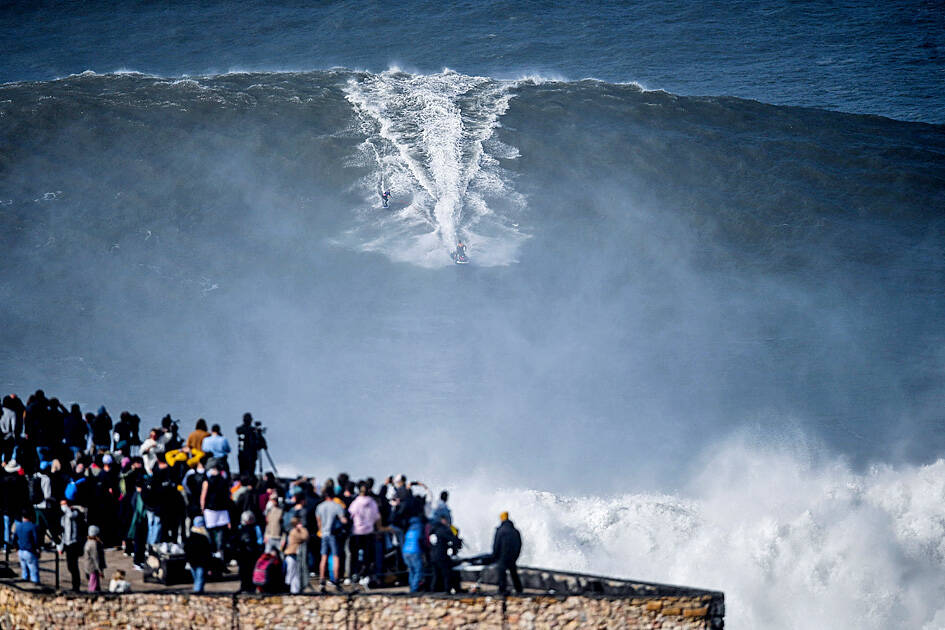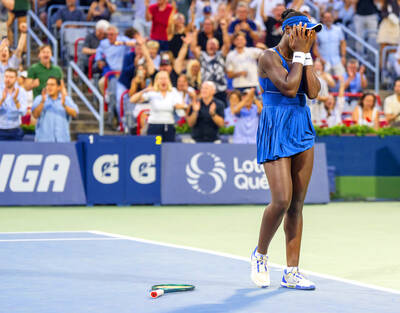The day after the death of Brazilian surfer Marcio Freire, a leaden silence settled over Nazare, the Portuguese fishing village that has become a winter destination for big-wave surfers.
Around the lighthouse perched on the rocky promontory of Praia do Norte, everything, even the ocean, seemed calm.
The rollers breaking on Friday were, for once, just a few meters high on a short stretch of coast in central Portugal that draws surfers keen to ride its famed wall of water.

Photo: AFP
The Nazare Canyon, a 5km deep crack in the floor of the continental shelf, allows waves to roll in with little loss of energy to be thrown upward as the fault ends just off the shore, creating giant breakers.
Since Hawaiian surfer Garrett McNamara rode a series of record-breaking Nazare waves starting in late 2011, the village has drawn big-wave surfers and those who like to watch them.
German Sebastian Steudtner set the world record for the tallest wave surfed, a 26.2m breaker, on Oct. 29, 2020.
On Thursday, Freire, a veteran big-wave chaser, died there at the age of 47.
He was being towed out in a moderate swell when he fell.
“The rescuers found that the victim was in cardiorespiratory arrest, immediately starting resuscitation maneuvers on the sand,” the Portuguese National Maritime Authority said in a statement. “It was not possible to reverse the situation.”
It was the first surfing death in the canyon, local authorities said, yet the conditions were relatively benign and Freire was an experienced surfer.
He was one of a trio of Brazilians who starred in a 2016 documentary called Mad Dogs about surfing the legendary Jaws wave in Hawaii without being towed.
On Friday, Nazare Maritime Police Commander Mario Lopes de Figueiredo said that they were still investigating how Freire died.
“The waves did not exceed 5m,” he said. “These are not difficult conditions for surfing here. On the days of the greatest swell, they reach between 15 and 20m.”
“The surfer fell and was submerged by the wave. Then he was hit by two or three waves from behind and he did not have time to react in time or found himself unconscious at the impact of the first,” he said.
Brazilian filmmaker Bred Oliveira, a member of Freire’s team, the “Jagua Boys,” filmed his friend’s last wave, thinking at the time he was simply recording a training session.
“We had no idea. Nobody really knows how it happened. I was filming and, suddenly, I heard the sirens of the rescuers,” he said.
“The world of big surfing is in mourning, many surfers are in shock,” he said.
Oliveira said he hopes that at least the accident will help “improve safety” in Nazare.

Taiwan’s top women’s badminton doubles duo, Hsieh Pei-shan (謝沛珊) and Hung En-tzu (洪恩慈), achieved a straight-sets victory over Japan’s Kaho Osawa and Mayui Tanabe at the Badminton World Federation (BWF) Super 300 Macau Open on Sunday. The Taiwanese pair won the final 21-18, 21-12, marking the duo’s second title this year after their win at the BWF Super 300 Taipei Open in May. The match on Sunday was their first encounter with the Japanese duo, ranked No. 63 in the world. Hsieh and Hung, ranked No. 12, began the opening game well. Hung, who plays left-handed, performed strongly at both the net and the

Canadian teenager Victoria Mboko upset top-seeded Coco Gauff 6-1, 6-4 on Saturday night to reach the National Bank Open quarter-finals. “Your support was incredible,” Mboko told the crowd in French after a chorus of “Ole, Ole, Ole” chants echoed around the venue. “I’m really happy to win today ... It’s incredible. I’m so happy to beat such a great champion.” Gauff dropped to 2-3 since winning the French Open. She followed the major victory with opening losses in Berlin and Wimbledon, then overcame double-fault problems to win two three-set matches in Montreal. Gauff had five double-faults on Saturday after having 23 in

Jobe Bellingham on Tuesday admitted to having “anxieties” on following in brother Jude’s footsteps after joining Borussia Dortmund in the summer. Jobe Bellingham, 19, is two years younger than Jude Bellingham, who joined Real Madrid in 2023 after three years at Dortmund. A centerpiece of the England national team, Jude Bellingham has emerged as one of the best players in the world in recent seasons. The younger Jobe Bellingham joined Dortmund in June from Sunderland after their promotion to the English Premier League. He admitted he understood what the perception would be ahead of the move to Germany. “It’s something you do think about.

Before Tuesday’s 7-2 win at the Atlanta Braves, Milwaukee Brewers manager Pat Murphy suggested “most people couldn’t tell you five players on our team.” A look at the standings would indicate more Brewers players soon will be recognized by more fans. After all, it is difficult to overlook a team that not only continues to extend their lead in the National League Central, but also boasts the best record in the majors. “What we’re doing in here right now is special,” right-handed pitcher Freddy Peralta said after allowing only four hits and one run in five innings, while setting a career high with